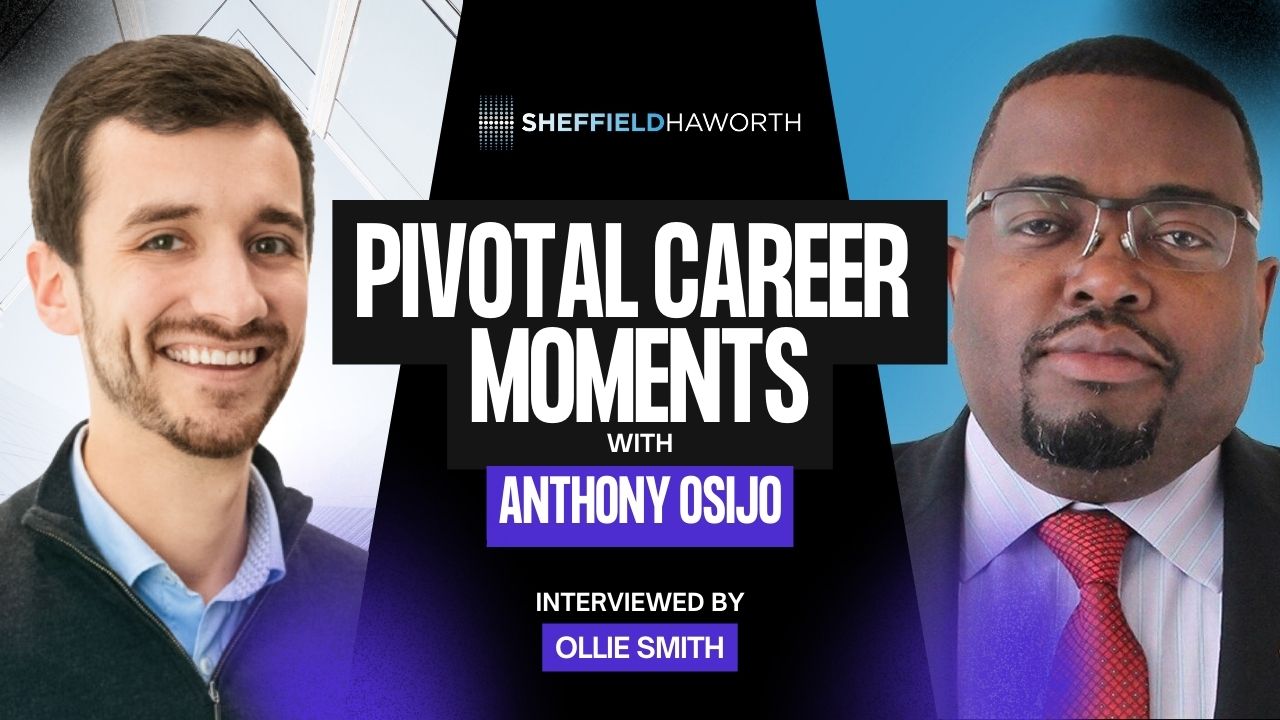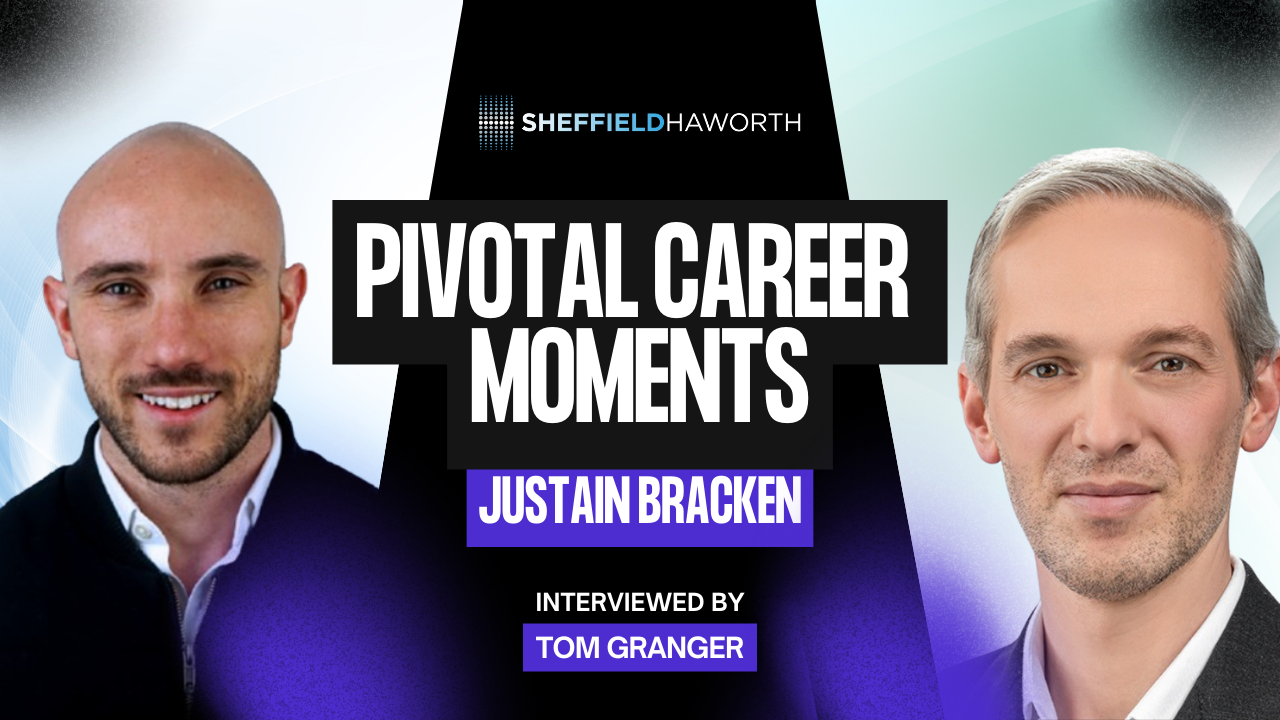Listen to the audio version of this article (generated by AI).
By Andrew Parker, Managing Director – Sheffield Haworth
Pavilion is the leading membership community for revenue leaders in fast-growth SaaS companies. In the last two years, CEO Sam Jacobs has grown the company from $4 million to $20 million revenue. And yet, he started the company as a support mechanism for his own career journey as a revenue leader in New York.
Here, Sam talks with Andrew Parker about Pavilion’s growth on the back of a counterintuitive approach to business success. He also discusses how revenue leader roles are continuing to evolve, his advice for revenue leaders in the current economic climate, and why VPs of Sales can no longer justify being the highest paid people in the room.
Q: What inspired you to start Pavilion?
Between 2010 and 2018, I was at B2B software companies running revenue, business development, sales, sometimes marketing. As my career progressed, my tenure in roles got shorter. Relatedly, there was no consistent definition of roles such as Chief Revenue Officer in terms of the skills or knowledge base expected.
So, I formed a dinner club in New York in 2014 – Revenue Collective – for revenue leaders to share best practices. I started it as a function of my need for assistance and support. After being fired from several roles, I decided I needed a side hustle or secondary revenue stream. That’s when I started charging for Revenue Collective and sold sponsorships.
I still never thought it would be a big thing, but I kept doing it. Then people reached out to me from London and Amsterdam. They wanted to partner with me to do something similar. Pretty soon we were in seven cities, and then 20, and then all over the world.
Q: How has your value proposition evolved, and how do you see it evolving in the future?
The fundamental premise hasn’t changed, and that’s to help our members get to where they want to go in their careers through community-powered learning. The evolution has been from an amorphous set of half-baked features to a much clearer, condensed set of three core products we deliver to our executive community. From there, we think we can power growth sustainably into the future.
Originally, we were a small word-of-mouth community where the ROI wasn’t clear. As we grew, we realised that we needed to build actual clearly-defined products with a clear ROI.
The first core product is education. Everyone understands taking a course online and getting a certificate or credential as a means of professional recognition. So, we built an online university which had 11,000 enrolments and 6,000 active students in 2022.
Students now start by taking a course and getting a certificate of completion. They also get a small community of 12 peers that they take the course with, which functions as their support group.
The second product is in-person events because executives need to develop meaningful relationships in person. We do four flagship summits and about 100 salon-style thought leadership dinners all over the world every year.
The third and final piece of what we do is defining community as a product. The biggest challenge of growing or scaling a community is that it ceases to be intimate and exclusive. So, we’ve broken the community into 35 sub-groups that we call Core Groups each made up of about 100 – 125 people. These retain that sense of intimacy within the larger world of Pavilion.
Q: How’s growth been for Pavilion – particularly considering the pandemic and the current global uncertainty?
2020 was the inflection point of our growth. We became a digital-first community during the pandemic and went from 800 members at the beginning of the year to around 3,700 members. We grew our ARR from around $1 million to about $4 million.
In spring 2021 I got outreach from Elephant Ventures in New York, raised $25 million, and had another strong growth year. In 2022 it got difficult. We hit the point where things stopped working and weren’t scaling anymore. That led to the distillation of our product set, clearer operational metrics, more of a focus on discipline and execution.
Even though everyone’s predicting recession, I think we’re better positioned for it now than we were last year.
Q: What’s the ultimate goal for you with Pavilion?
We’re working on a couple core ideas which could extend to potentially millions of people, if not tens of millions. The first is that professionals within every industry category are going to need training and development across a wide range of subject matters, disciplines, and technologies. The current educational and training environment is not equipped to deliver that.
The second idea is that Pavilion as a community is built on a set of fundamental concepts that show there is a different way to be successful in business. That you can give before you get, build relationships not transactions, take a long-term view.
Really my goal is to take what was originally a technology-enabled networking and services business and build software that enables us to scale and deliver this idea of vocational training led by practitioners underpinned by a core set of values around reciprocity and mutual support.
Q: What made you decide to take time out to write your book Kind Folks Finish First?
My life changed when I began to embrace a set of ideas that I thought were antithetical to how business should operate. The only reason that my life changed was because I changed my beliefs and my perspective. I felt maybe this was an interesting story to share with other people and a story that people needed to hear.
In the story I describe in the book, I go from being pretty transactional and not standing for anything more than making money to realising that you get money by helping people or by building something that you care about and value.
There were a lot of other moments in my life – particularly over the last five years – that led to a lot of the success we’ve had. The book is an attempt to codify and articulate that. But the point of the book and of the title Kind Folks Finish First is to repudiate the common American saying “nice guys finish last”.
This book is not about saying money or professional ambition don’t matter. If those things matter to you, the book shows you a different way to achieve them. This is a competition framework that goes against the grain, and which will help you get exactly what you want.
Q: What was the hardest part of Pavilion’s journey to date?
2022 has been the hardest year by a factor. We went from me thinking that everything I touched turned to gold and how great am I to a lot of things no longer working. I realised I didn’t have the right team at the beginning of the year. And we didn’t have a clear category or clear product definition, or a three-year plan. A lot of my executives didn’t know what they should be working towards in the next 36 months. We’ve been working on a lot of that stuff this year, and it’s been painful. I’ve made more mistakes than I care to admit.
But I wouldn’t trade it for the world. Don’t you want to be on the pitch playing for the premier league? That doesn’t mean you’re going to win every match, but that’s where you want to be playing and that’s how I feel right now.
At the beginning of 2022, I didn’t have an engineering team, but now I’ve got one and we’ve got a digital platform that will roll out to members in a couple months. We’re a close to $20 million business but we are a hodgepodge of Slack, Zoom, HubSpot and a bunch of other third-party services. Now that we’ll have our own platform I feel like we’re on the cusp of something really big.
Q: Tell me about your thoughts on revenue leadership and how it’s changed.
There was a period when top-line growth was all that mattered and any deal that you needed to hit your targets was a good deal. Now, if you sell in recurring revenue businesses, deals that don’t renew are no good. More and more people realise we’re investing in customer success. That requires alignment with others because revenue is more of a team sport.
Revenue generation is a cross-functional alignment between Sales, Marketing, Customer Success and Operations. It’s become more sophisticated, much more data-driven, more customer-oriented, and more complicated.
Q: What makes a great revenue leader today?
The truly great revenue leaders have some kind of finance affinity. Yes, you need to be able to rally the troops but, if you are constantly the antagonist to the CFO, you are short for this world. The first-time VP thinks that their job is to advocate for their team. The seasoned executive knows that that won’t get you credibility and your inputs become facile and one-sided.
The true executive can stand outside of their department and has a holistic view of the business informed by some kind of financial acumen. The more sophisticated revenue leader understands how to read a P&L. They understand customer acquisition cost. And they understand how to move money around in different, unexpected ways as they search for efficient outcomes and ROI.
Q: Why do you think companies make so many mistakes hiring into this kind of role?
People make mistakes hiring every role, but it’s also not as simple as that. Most people have a specific skillset and a specific place where they’re comfortable. You do get people who are able to deal with the challenges of a business at $1 million revenue, $5 million revenue, $20 million revenue, $100 million revenue or more. But those people are rare.
Is there a benefit to helping your leadership team develop and grow? One hundred per cent, and I want Pavilion to be a place where people grow and develop. But you also have to admit there are people that have done this before, and it would be a shorter, less painful process if they were here instead. That’s one of the reasons why it becomes difficult for many leaders to stay at a company for six or seven years.
Q: What’s your advice for revenue leaders, especially those in a cooling SaaS market, as we go into 2023?
It’s going to be choppy. If you can, find founders and CEOs that understand that revenue is a team sport, that you are not the saviour and also not the villain. You are one part of a team that is generating revenue as a function of product-market fit.
If you can find somebody that supports you in that way and gives you reasonable growth expectations, then you can be in a good situation. But I think it’s about fit because there are companies out there that will still set unreachable revenue goals as a function of ambition – when in reality, it’s not about ambition, it’s about market forces.
Too many people want to be the martyr and need to be the highest paid person in the room. But revenue is more about teamwork than ever, so maybe we need to revisit the idea that the VP of Sales is the highest paid person at the company. Maybe we need to pay revenue leaders the same way we pay product leaders, engineers and marketing leaders. Maybe all the senior execs should be paid the same and all get paid a bonus when you hit your company goals.













